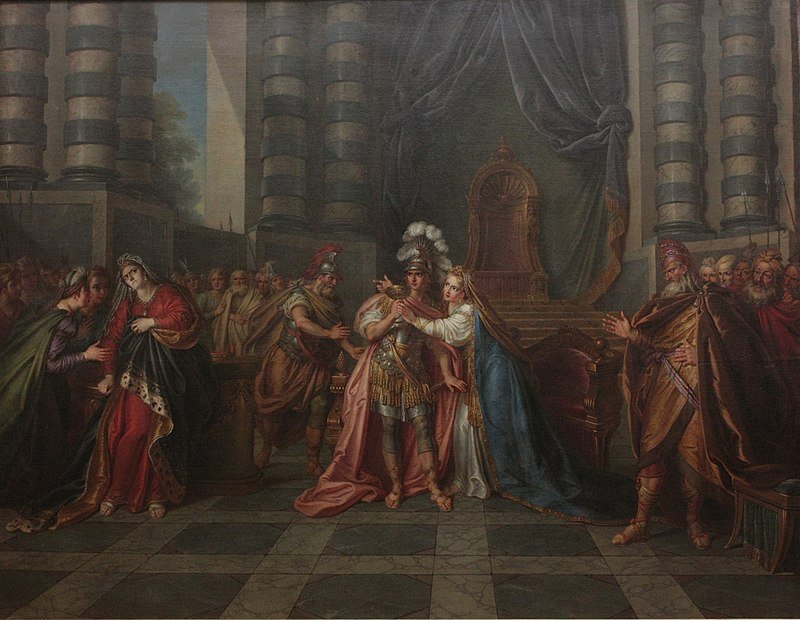Rhodogune Of Parthia Refused To Bath And Comb Her Hair Until She Subdued The Rebels
Ellen Lloyd - AncientPages.com - Some people are so dedicated to a cause that they can do things most of us consider incredible. When Rhodogune of Parthia learned about an uprising she refused to bathe and comb her hair until she had subdued the rebels. Fortunately for her, she accomplished what she wanted in a short time.
Rhodogune was the daughter of the Parthian king Mithridates I (171 B.C, -132 B.C.), and sister of Phraates II who ruled between 132 B.C. and -127 B.C.
Anachronistic painting of Rhodogune with Cleopatra II of Egypt by the 18th-century French painter Charles-Antoine Coypel. The Seleucid ruler Antiochus VIII Grypus is to the far right. Credit: Public Domain
As the wife of Seleucid king Demetrius II Nicator she lived with her husband and their children in Hyrcania on the shores of the Caspian sea. Hyrcania which means "Wolf-land", bordered Parthia to the East, and after the Sasanian Empire in 651 AD, Hyrcania was known as Tabaristan.
Life changed dramatically for Rhodogune during the invasion of Parthia by Demetrius' brother, Antiochus VII Sidetes. After an ill-fated campaign in Babylonia, her husband tried to on several occasions to escape from Parthia, but he failed.
The Parthians established an empire that lasted almost 500 years, from the mid-3rd century BC until 224 CE. Their empire was the most lasting of the empires of the ancient Near East.
They came to power under king Mithradates the Great (171-138 BC); their territories stretched from the Euphrates River in the west to Central Asia and the borders of Bactria in the east. The Parthian empire occupied Iraq, Armenia, all of modern Iran, parts of Turkey, Georgia, Azerbaijan, Turkmenistan, Afghanistan, and Tajikistan, and for short time, also territories in Pakistan, Syria, Lebanon, Israel, and Palestine.
Strangely, despite their enormous role in forming a strong link between the peoples of East Asia and Europe - the Parthians were overshadowed by the Achaemenids and Sassanids.
In 200 B.C. Rhodogune “got word of a revolt when she was taking a bath. Vowing to end the uprising before her hair was dressed, she hopped on her horse and rushed to lead her army to defense. True to her word, she directed the entire, lengthy war without ever bathing or combing her hair. Portraits of Rhodogune al-ways faithfully depict her dishevelment.” 1
According to Aeschines, (390 B.C. - 314 B.C) orator and statesman of Athens, Rhodogune, queen of the Persians “made the Persian kingdom most powerful. For she was, he says, so brave in her deeds and frightening that once, while in midst of arranging her hair, she heard that several tribes had rebelled, She left her hair semi-braided and did not braid if until she had captured and subdued the aforementioned tribes. That is why a golden statue of her was dedicated, with haft her hair braided round her head and other half hanging loose.” 2
Rhodogune Of Parthia is one of many ancient women who accomplished something that changed history and yet, there is so little historical information about her.
Written by - Ellen Lloyd – AncientPages.com
Copyright © AncientPages.com All rights reserved. This material may not be published, broadcast, rewritten or redistributed in whole or part without the express written permission of AncientPages.com
Expand for referencesMore From Ancient Pages
-
 Ancient Secrets Of The Theopetra Cave: World’s Oldest Man-Made Structure And Home To Humans 130,000 Years Ago
Civilizations | May 12, 2016
Ancient Secrets Of The Theopetra Cave: World’s Oldest Man-Made Structure And Home To Humans 130,000 Years Ago
Civilizations | May 12, 2016 -
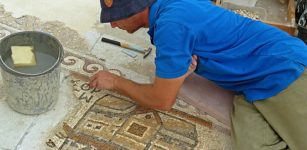 A Rare 1,500 Year Old Mosaic That Depicts Ancient Streets And Buildings in Egypt – Discovered
News | Sep 29, 2015
A Rare 1,500 Year Old Mosaic That Depicts Ancient Streets And Buildings in Egypt – Discovered
News | Sep 29, 2015 -
 Melusine: Charming Water Fairy In European Legend About Taboo And Broken Promise
Featured Stories | Jan 2, 2019
Melusine: Charming Water Fairy In European Legend About Taboo And Broken Promise
Featured Stories | Jan 2, 2019 -
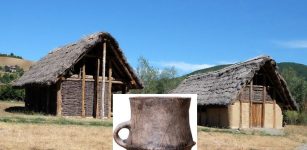 Late Neolithic Italians Mastered Complex Metal Technologies – New Study
Archaeology | Jan 22, 2020
Late Neolithic Italians Mastered Complex Metal Technologies – New Study
Archaeology | Jan 22, 2020 -
 On This Day In History: Famous Inventor Thomas Edison Died – On Oct 18, 1931
News | Oct 18, 2016
On This Day In History: Famous Inventor Thomas Edison Died – On Oct 18, 1931
News | Oct 18, 2016 -
 Mysterious Pyramid-Shaped Tomb Discovered In China
Archaeology | Mar 15, 2017
Mysterious Pyramid-Shaped Tomb Discovered In China
Archaeology | Mar 15, 2017 -
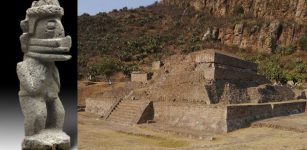 Who Built The Mysterious Huapalcalco Pyramid – Mexico’s Smallest Pyramid?
Featured Stories | Mar 29, 2018
Who Built The Mysterious Huapalcalco Pyramid – Mexico’s Smallest Pyramid?
Featured Stories | Mar 29, 2018 -
 Mysterious Underwater Ruins In Canada And America – Evidence Of An Unknown Ancient Civilization?
Civilizations | Sep 17, 2020
Mysterious Underwater Ruins In Canada And America – Evidence Of An Unknown Ancient Civilization?
Civilizations | Sep 17, 2020 -
 Mysterious Camerano Underground City – Secret Meeting Place For Knights Templar?
Featured Stories | Dec 13, 2017
Mysterious Camerano Underground City – Secret Meeting Place For Knights Templar?
Featured Stories | Dec 13, 2017 -
 Mysterious Anomaly In Earth’s Magnetic Field Documented On 3,000-Year-Old Mesopotamian Bricks
Archaeology | Dec 18, 2023
Mysterious Anomaly In Earth’s Magnetic Field Documented On 3,000-Year-Old Mesopotamian Bricks
Archaeology | Dec 18, 2023 -
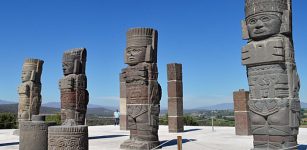 Obscure History Of Atlantean Statues In Ancient Toltecs’ City Of Tula
Artifacts | Oct 19, 2020
Obscure History Of Atlantean Statues In Ancient Toltecs’ City Of Tula
Artifacts | Oct 19, 2020 -
 On This Day In History: Riot Over Wine In Oxford – On Feb 10, 1355
News | Feb 10, 2017
On This Day In History: Riot Over Wine In Oxford – On Feb 10, 1355
News | Feb 10, 2017 -
 John Dee’s Magical Mirror Used To Contact Spirits Can Be Traced To The Aztecs
Archaeology | Oct 7, 2021
John Dee’s Magical Mirror Used To Contact Spirits Can Be Traced To The Aztecs
Archaeology | Oct 7, 2021 -
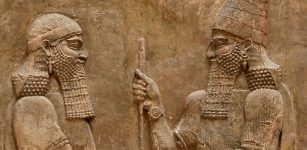 Fragment Of A Royal Memorial Inscription Attributed To Sargon II – Unearthed
Archaeology | May 5, 2021
Fragment Of A Royal Memorial Inscription Attributed To Sargon II – Unearthed
Archaeology | May 5, 2021 -
 Edfu Texts Reveal Secrets Of Predynastic Egypt And Zep Tepi
Egyptian Mythology | May 27, 2021
Edfu Texts Reveal Secrets Of Predynastic Egypt And Zep Tepi
Egyptian Mythology | May 27, 2021 -
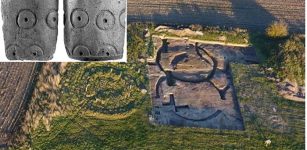 Dazzling Time Capsule Of Unique Iron Age Artifacts And Celtic Roundhouses Discovered In England
Archaeology | Mar 15, 2022
Dazzling Time Capsule Of Unique Iron Age Artifacts And Celtic Roundhouses Discovered In England
Archaeology | Mar 15, 2022 -
 5,000-Year-Old Arminghall Henge In Norwich Reveals Some Of Its Secrets
Archaeology | Dec 20, 2022
5,000-Year-Old Arminghall Henge In Norwich Reveals Some Of Its Secrets
Archaeology | Dec 20, 2022 -
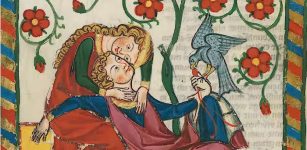 Valentine’s Day’s Connection With Love Was Probably Invented By Chaucer And Other 14th-Century Poets
Ancient Traditions And Customs | Feb 14, 2023
Valentine’s Day’s Connection With Love Was Probably Invented By Chaucer And Other 14th-Century Poets
Ancient Traditions And Customs | Feb 14, 2023 -
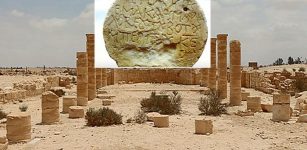 Tombstone With Ancient Greek Inscription Unearthed Near Nitzana In The Negev, Israel
Archaeology | Jan 8, 2021
Tombstone With Ancient Greek Inscription Unearthed Near Nitzana In The Negev, Israel
Archaeology | Jan 8, 2021 -
 How Did St. Nicholas Become Santa Claus? – History, Legend And Tradition
Featured Stories | Dec 22, 2023
How Did St. Nicholas Become Santa Claus? – History, Legend And Tradition
Featured Stories | Dec 22, 2023

